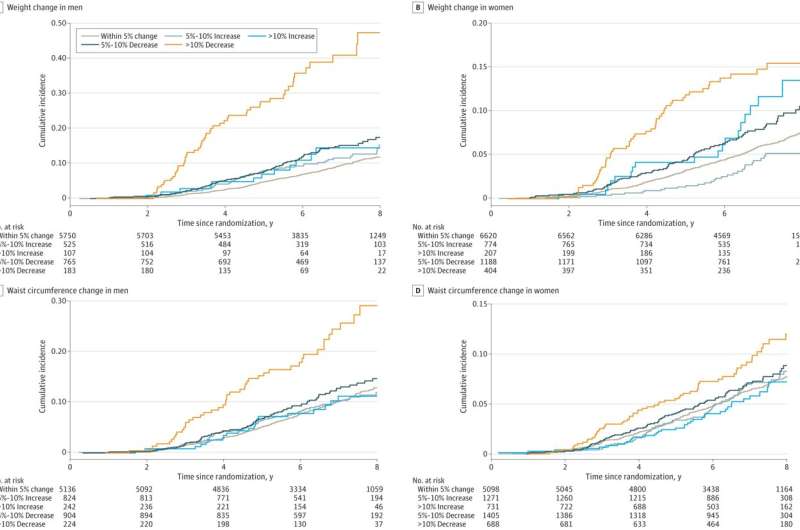
An international team of researchers led by Monash University in Australia has examined the associations of changes in body weight and waist circumference with all-cause and cause-specific mortality. In the paper, “Associations of Change in Body Size With All-Cause and Cause-Specific Mortality Among Healthy Older Adults,” published in JAMA Network Open, the team highlights the startling connection between weight loss and increased risk of death.
The researchers used data from a past study looking at aspirin use in 16,703 Australian participants aged 70 and above. They focused on weight recordings, waist circumference measurements and mortality information over time. The cohort consisted of 7,510 men and 9,193 women. All the individuals were without evident cardiovascular disease, dementia, physical disability, or life-limiting chronic illnesses.
Both body weight and waist circumference changes were categorized as change within 5% (stable), decrease by 5% to 10%, decrease by more than 10%, increase by 5% to 10%, and increase by more than 10%.
Using men with stable weight as a control, men with a 5% to 10% weight loss had a 33% higher risk of all-cause mortality, and those with more than a 10% decrease in body weight had a 289% higher risk.
Compared to women with stable weight, women with a 5% to 10% weight loss had a 26% higher risk of all-cause mortality, and those with more than a 10% decrease in body weight had a 114% higher risk.
A more than 10% decrease in waist circumference was associated with a 2.14-fold higher risk of all-cause mortality for men and a 34% higher risk of all-cause mortality for women.
There was no significant association between weight gain and increases in waist circumference and all-cause mortality.
The researchers state it is likely that weight loss is an early indicator of the presence of various life-shortening diseases. While weight loss may precede a cancer diagnosis, the study revealed that weight loss also precedes increased mortality from all causes, including deaths from cardiovascular disease, trauma, dementia, Parkinson’s disease, and other less common causes.
The weight loss was primarily associated with reduced appetite, leading to reduced food intake. The paper describes appetite as a complex process governed by both the central nervous system and various circulating hormones, any of which might be disrupted ahead of more pronounced disease presentation.
The researchers conclude that physicians and their patients should be aware of the significant association between mortality and elder weight loss.
More information:
Sultana Monira Hussain et al, Associations of Change in Body Size With All-Cause and Cause-Specific Mortality Among Healthy Older Adults, JAMA Network Open (2023). DOI: 10.1001/jamanetworkopen.2023.7482
Journal information:
JAMA Network Open
Source: Read Full Article